14.00 น.ณาปนกิจศพที่วัดตรีทศเทพ มีผู้ไปร่วมพิธีประมาณ 3,000 คน ดร.ทัศนีย์ กล่าวไว้อาลัยต่อ ดร.บุญสนองจากนั้นได้เซ็นชื่อลงบนภาพขนาดใหญ่ของดร.บุญสนอง ตามด้วยผู้ที่ไปร่วมพิธี คือ ดร.ป๋วย อึ้งภากรณ์ นพ.กระแส ชนะวงศ์ และนิสิตนักศึกษาประชาชน ซึ่งภาพเขียนนี้ ทางพรรคสังคมนิยม ได้นำไปตั้งไว้ยังที่ทำการพรรคในเวลาต่อมา
วันอาทิตย์ที่ 28 กุมภาพันธ์ พ.ศ. 2564
ประวัติ ดร.บุญสนอง บุณโยทยาน
14.00 น.ณาปนกิจศพที่วัดตรีทศเทพ มีผู้ไปร่วมพิธีประมาณ 3,000 คน ดร.ทัศนีย์ กล่าวไว้อาลัยต่อ ดร.บุญสนองจากนั้นได้เซ็นชื่อลงบนภาพขนาดใหญ่ของดร.บุญสนอง ตามด้วยผู้ที่ไปร่วมพิธี คือ ดร.ป๋วย อึ้งภากรณ์ นพ.กระแส ชนะวงศ์ และนิสิตนักศึกษาประชาชน ซึ่งภาพเขียนนี้ ทางพรรคสังคมนิยม ได้นำไปตั้งไว้ยังที่ทำการพรรคในเวลาต่อมา
วันพฤหัสบดีที่ 28 กุมภาพันธ์ พ.ศ. 2562
เยือนที่เกิดเหตุลอบสังหาร 'บุญสนอง บุณโยทยาน' เมื่อปี 2519 (จากเว็บไซต์ประชาไท)
รายงานพิเศษจาก 'ทีมข่าวการเมืองสำนักข่าวประชาไท' เมื่อปี 2562 พาสำรวจที่เกิดเหตุลอบยิง 'บุญสนอง บุณโยทยาน' เลขาธิการพรรคสังคมนิยมแห่งประเทศไทยที่เกิดขึ้นวันนี้เมื่อ 43 ปีที่แล้วในช่วง "ขวาพิฆาตซ้าย" ก่อนเหตุการณ์ 6 ตุลาคม 2519 โดยผ่านมา 4 ทศวรรษปัจจุบันจุดลอบยิง 'บุญสนอง' อยู่ที่ปากซอยวิภาวดีรังสิต 44 และจุดขึ้นลงสถานีรถไฟฟ้าสายสีแดง สถานีวัดเสมียนนารีเป็นหมุดหมายที่เกิดเหตุ
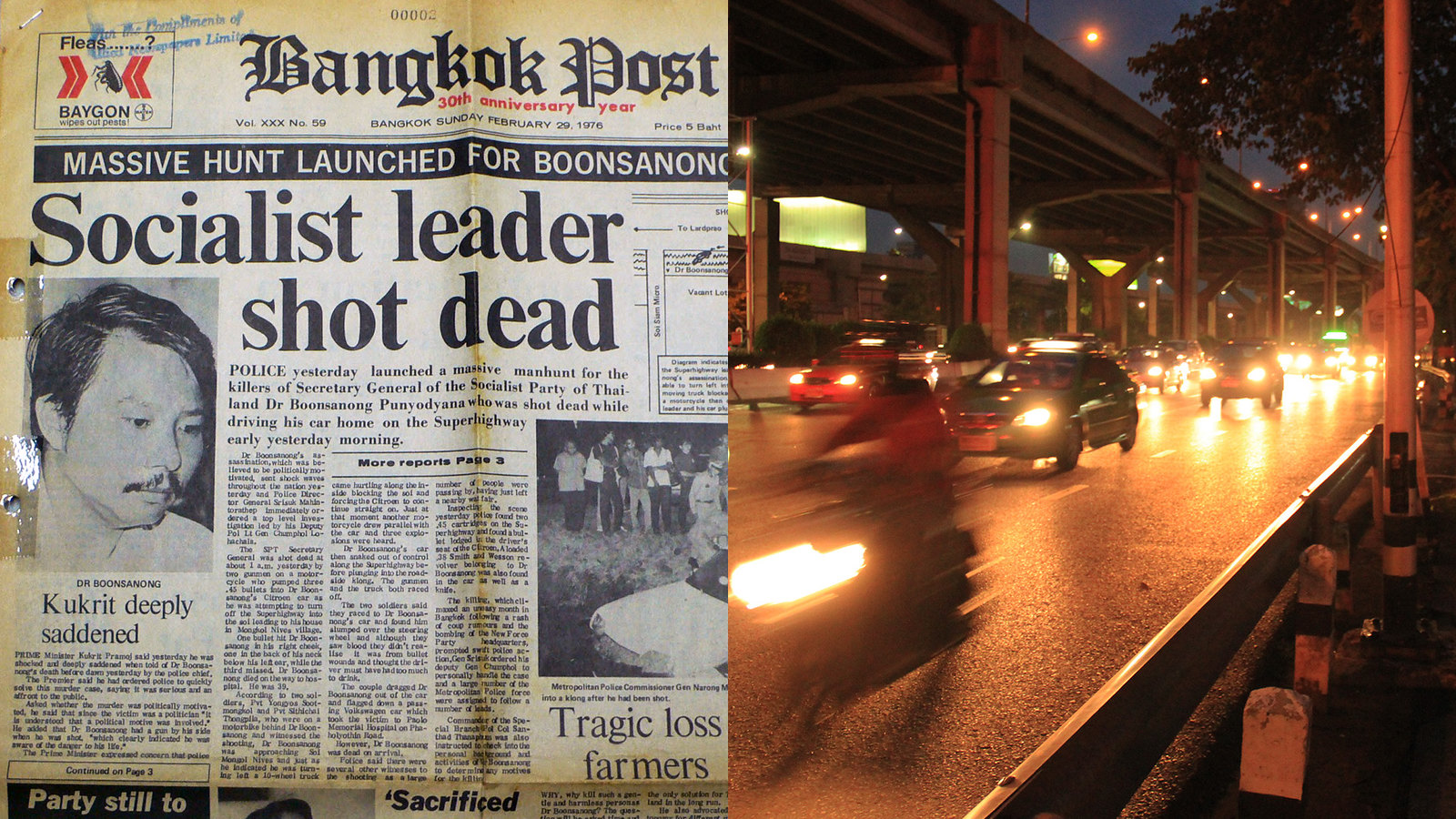
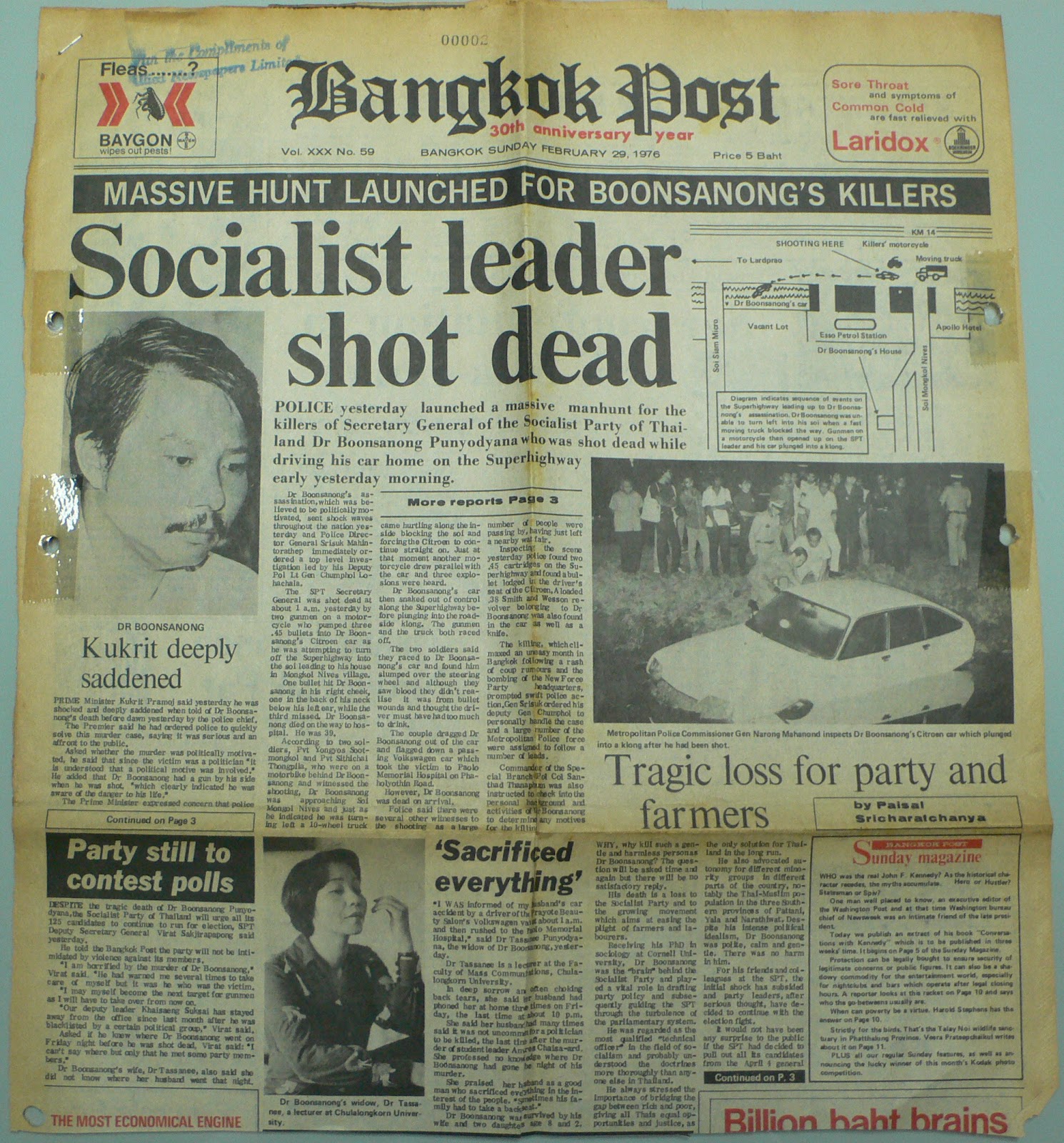
หนังสือพิมพ์บางกอกโพสต์ฉบับวันที่ 29 กุมภาพันธ์ 1976 ลงข่าวลอบสังหารบุญสนอง บุณโยทยาน
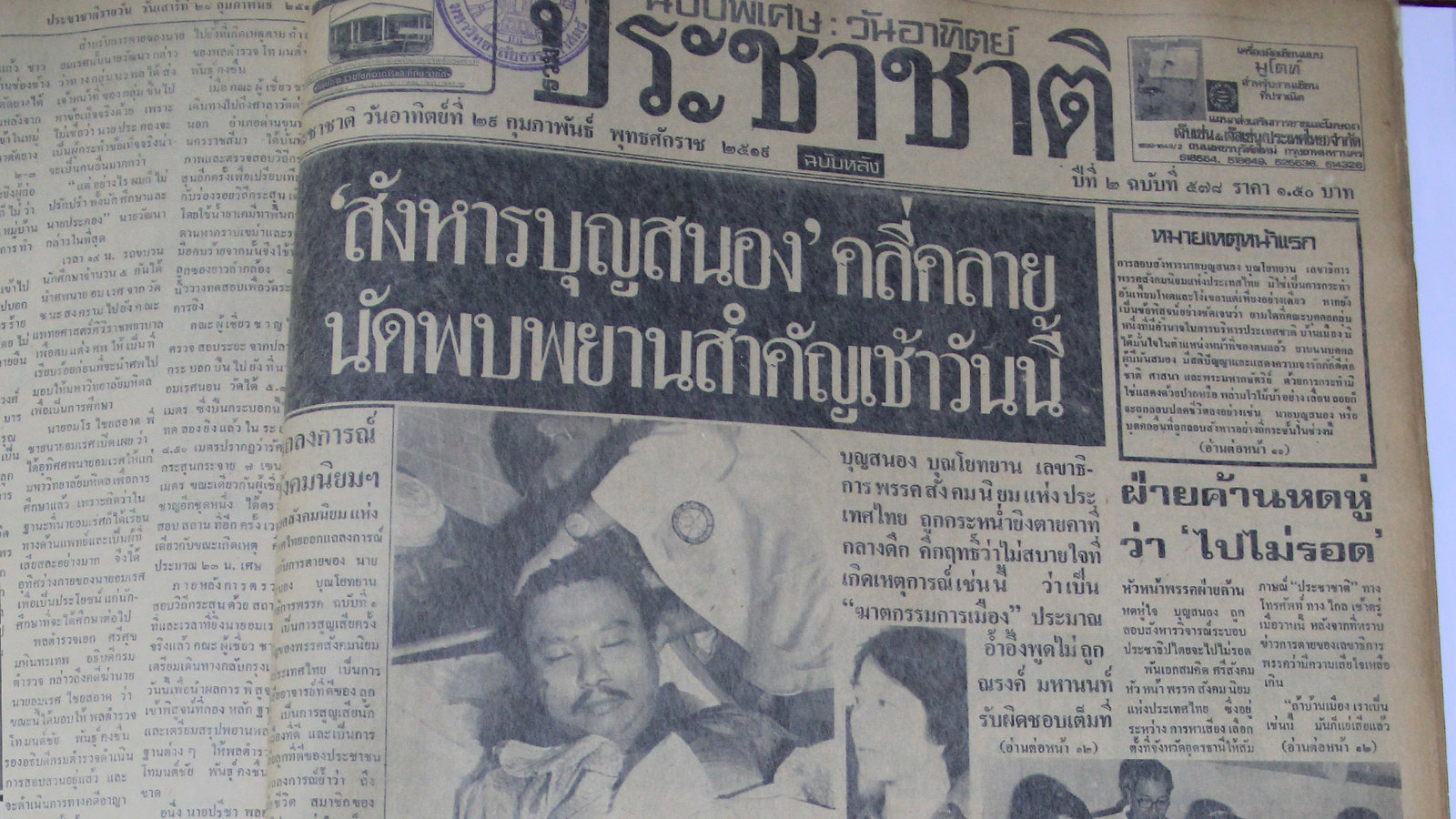
หนังสือพิมพ์ประชาชาติฉบับวันที่ 29 กุมภาพันธ์ 2519 ลงข่าวลอบสังหารบุญสนอง บุณโยทยาน
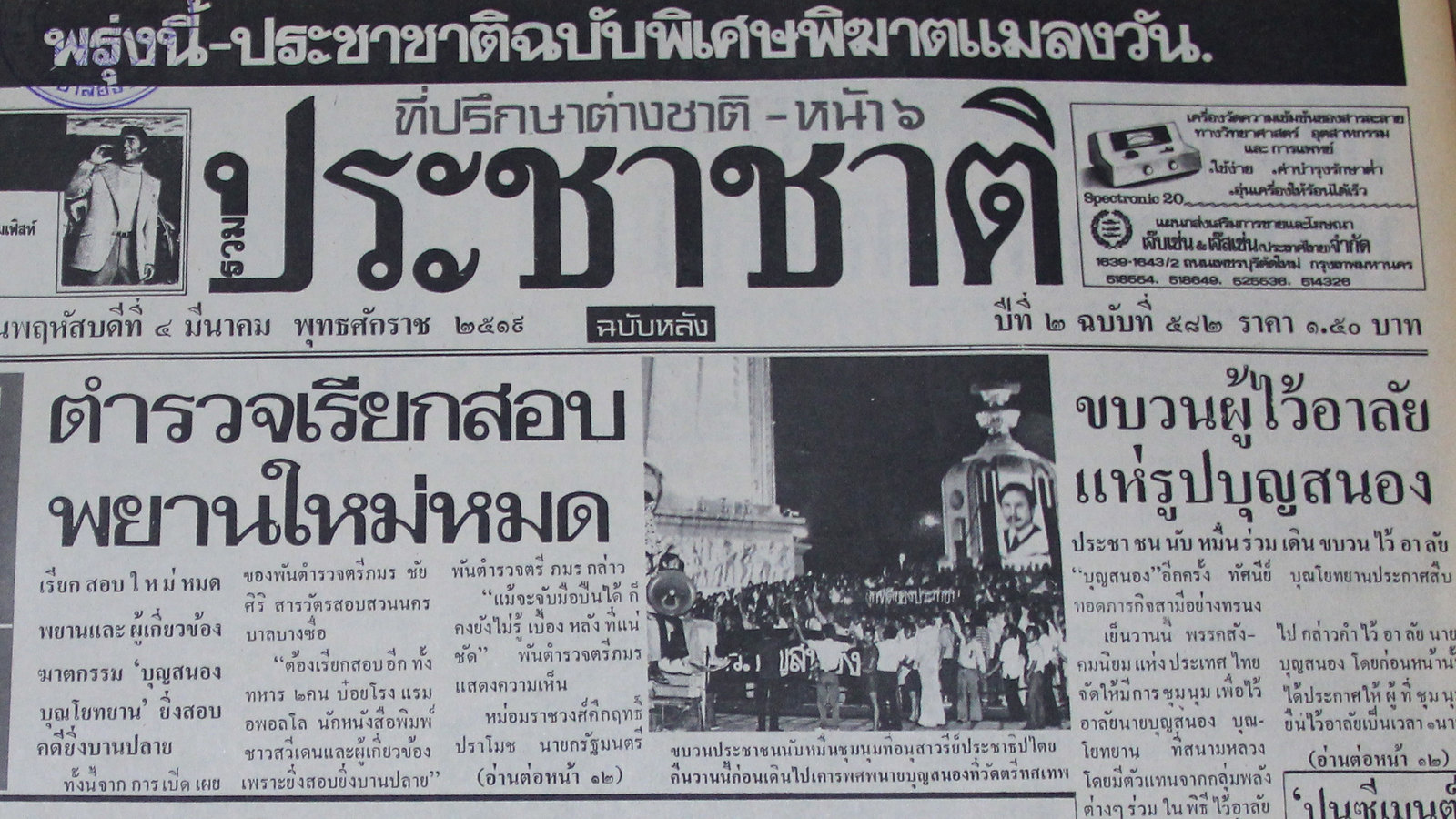
หนังสือพิมพ์ประชาชาติฉบับวันที่ 4 มีนาคม 2519 ลงข่าวประชาชนชุมนุมที่อนุสาวรีย์ประชาธิปไตยเมื่อวันที่ 3 มีนาคม 2519 ก่อนเดินไปร่วมงานศพบุญสนอง บุณโยทยาน ที่วัดตรีทศเทพ
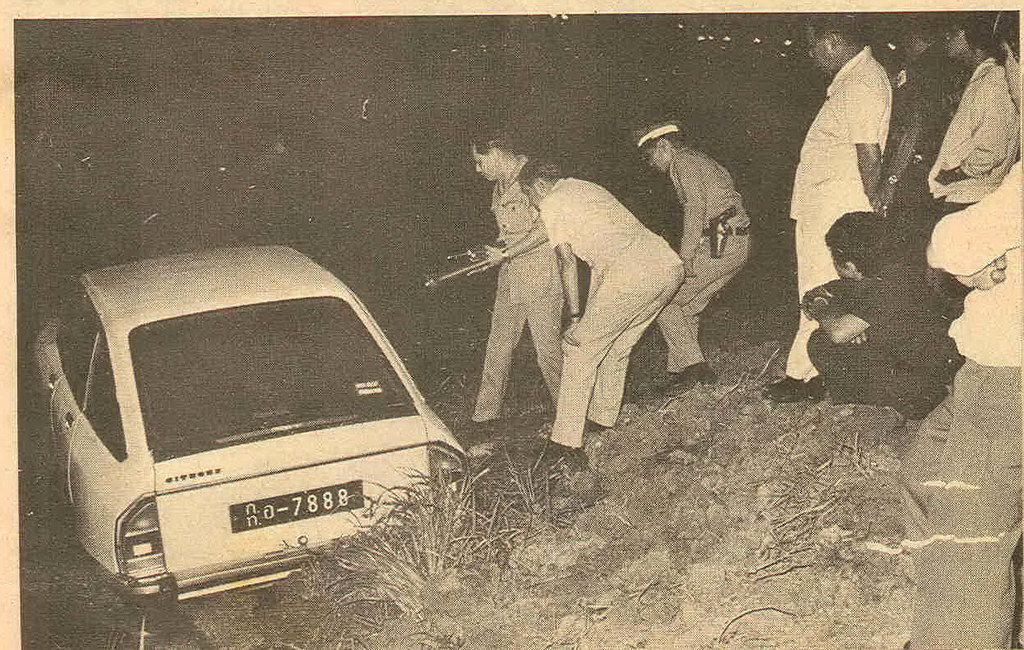
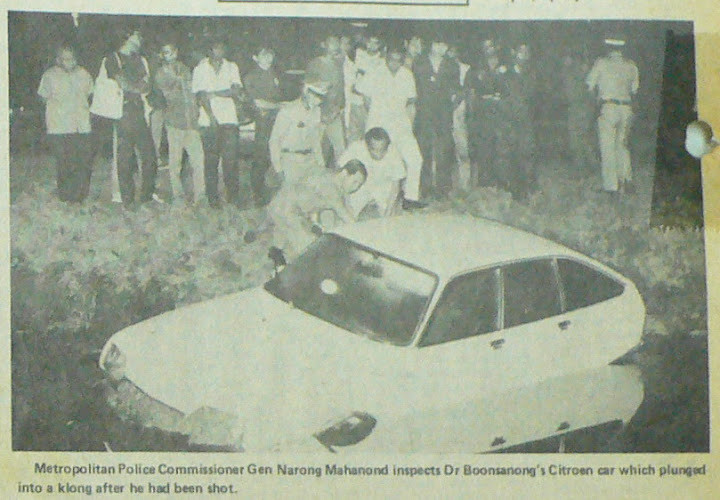
รถยนต์ซีตรองสีขาว ทะเบียน กท.อ.7888 ของบุญสนอง บุณโยทยาน ตกลงไปในคูน้ำข้างถนนวิภาวดีรังสิต เลยปากซอย 44 (ที่มา: Bangkok Post, 29 February 1976 P.1 และ doctorboonsanong.blogspot.com อ้างจากหนังสือพิมพ์ไม่ทราบฉบับ, ไม่ทราบวันที่พิมพ์)
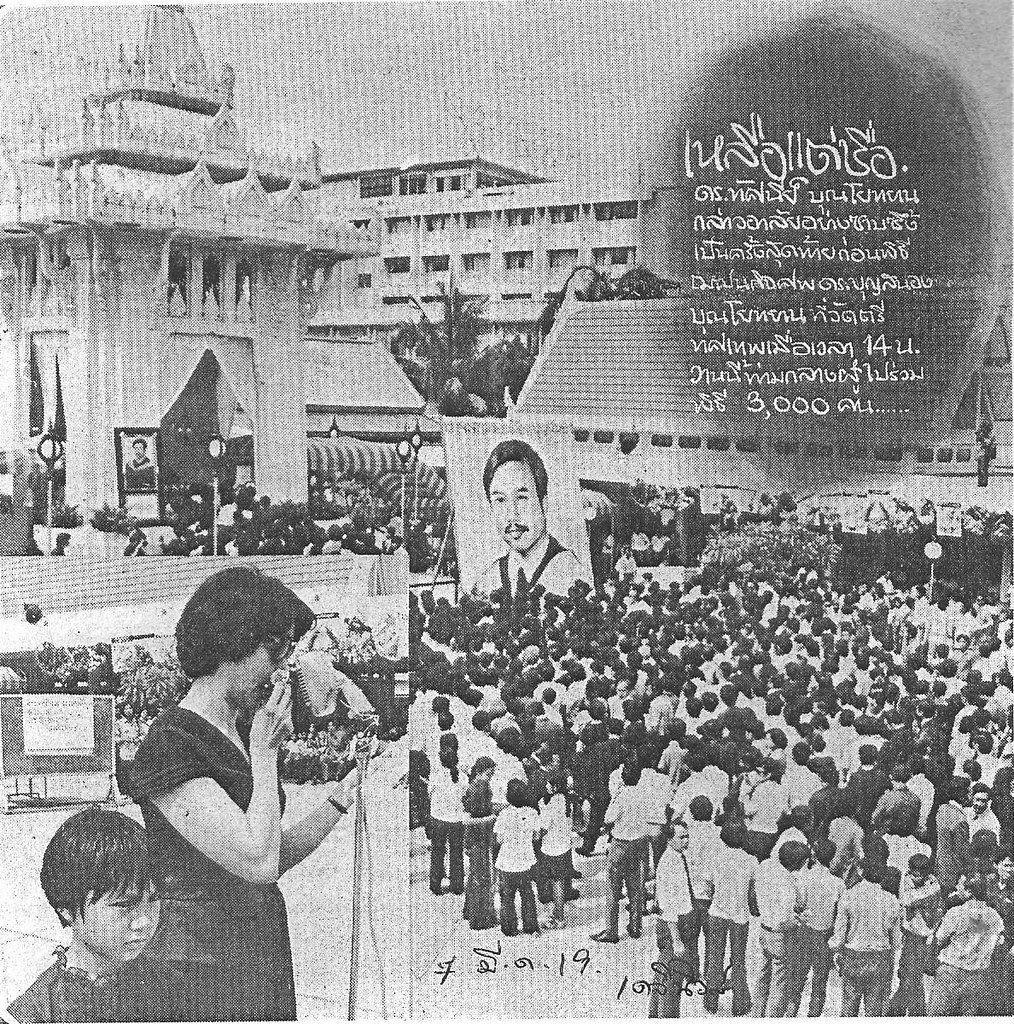
งานฌาปนกิจบุญสนอง ที่วัดตรีทศเทพ เวลา 14.00 น. วันที่ 6 มีนาคม 2519 (ที่มา: เดลินิวส์, 7 มีนาคม 2519 อ้างจาก doctorboonsanong.blogspot.com)
วันนี้เมื่อ 43 ปีที่แล้ว หรือเมื่อเช้าเวลา 01.30 น. วันที่ 28 กุมภาพันธ์ 2519 บุญสนอง บุณโยทยาน เลขาธิการพรรคสังคมนิยมแห่งประเทศไทยถูกลอบยิงเสียชีวิต โดยเป็นการเสียชีวิตก่อนการเลือกตั้ง 4 เมษายน 2519
ในคืนเกิดเหตุวันที่ 27 กุมภาพันธ์ 2519 บุญสนองไปร่วมงานเลี้ยงส่งมาโกท์ แฮงกี้ เลขานุการโทสถานทูตออสเตรเลีย ต่อมาเวลา 01.30 น. ของเช้าวันที่ 28 กุมภาพันธ์ 2519 บุญสนองซึ่งขับรถซีตรองสีขาว ทะเบียน กท.อ.7888 มาถึงถนนซุปเปอร์ไฮเวย์ และขับผ่านหน้าโรงแรมอพอลโล ก่อนถึงปากซอยหมู่บ้านมงคลนิเวศน์ ปัจจุบันคือถนนวิภาวดีรังสิต ซอย 44 เพื่อกลับบ้านพักภายในซอย ได้ถูกยิงจากรถบรรทุกสิบล้อที่ขับตามมาตั้งแต่แยกหลักสี่และแล่นประกบกันมาจนเลยสี่แยกบางเขน พอข้ามสะพานเยื้องหน้าโรงแรมอพอลโลก็เกิดเสียงปืน เป็นเหตุให้รถแฉลบลงคูข้างทาง
หนังสือพิมพ์ประชาชาติวันที่ 29 กุมภาพันธ์ 2519 รายงานว่า มือปืนซึ่งนั่งมาในรถบรรทุกสิบล้อแล่นขนาบข้างด้านขวาของรถบุญสนอง แล้วกระหน่ำยิงเข้าท้ายทอยด้านขวาของบุญสนอง โดยตำรวจนำศพบุญสนองไปที่โรงพยาบาลลเปาโล โดย พล.ต.ท.ชุมพล โลหะชาละ รองอธิบดีกรมตำรวจฝ่ายกิจการพิเศษ กับ พล.ต.ท.ณรงค์ มหานนท์ ผู้บัญชาการตำรวจนครบาล รุดไปชันสูตรศพ ส่วนหนังสือพิมพ์ประชาธิปไตยวันที่ 29 กุมภาพันธ์ 2519 รายงานว่ามีรถของสถานเสริมสวย "ประโยชน์บิวตี้" ซึ่งกำลังกลับจากเที่ยวงานวัดเสมียนนารี มายังที่เกิดเหตุเพื่อช่วยกันนำบุญสนองออกจากรถ และรีบส่งโรงพยาบาลเปาโลเมื่อเวลา 01.40 น. แต่ปรากฏว่าบุญสนองถึงแก่กรรมเสียก่อน
เยือนสถานที่เกิดเหตุในอีก 4 ทศวรรษถัดมา
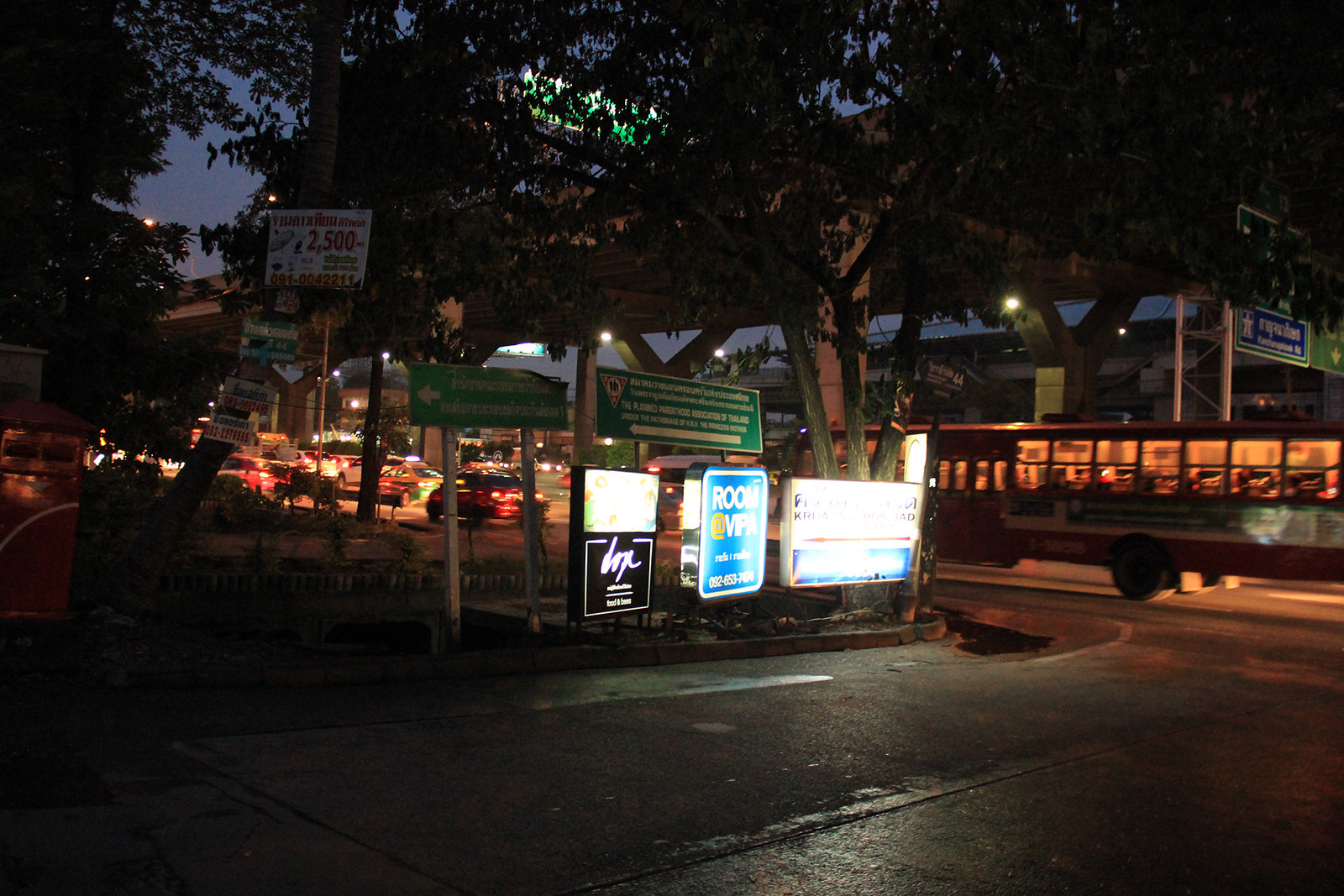
ปากซอยวิภาวดีรังสิต 44 จุดลอบยิงบุญสนอง บุณโยทยาน ภาพถ่ายเดือนตุลาคม 2559
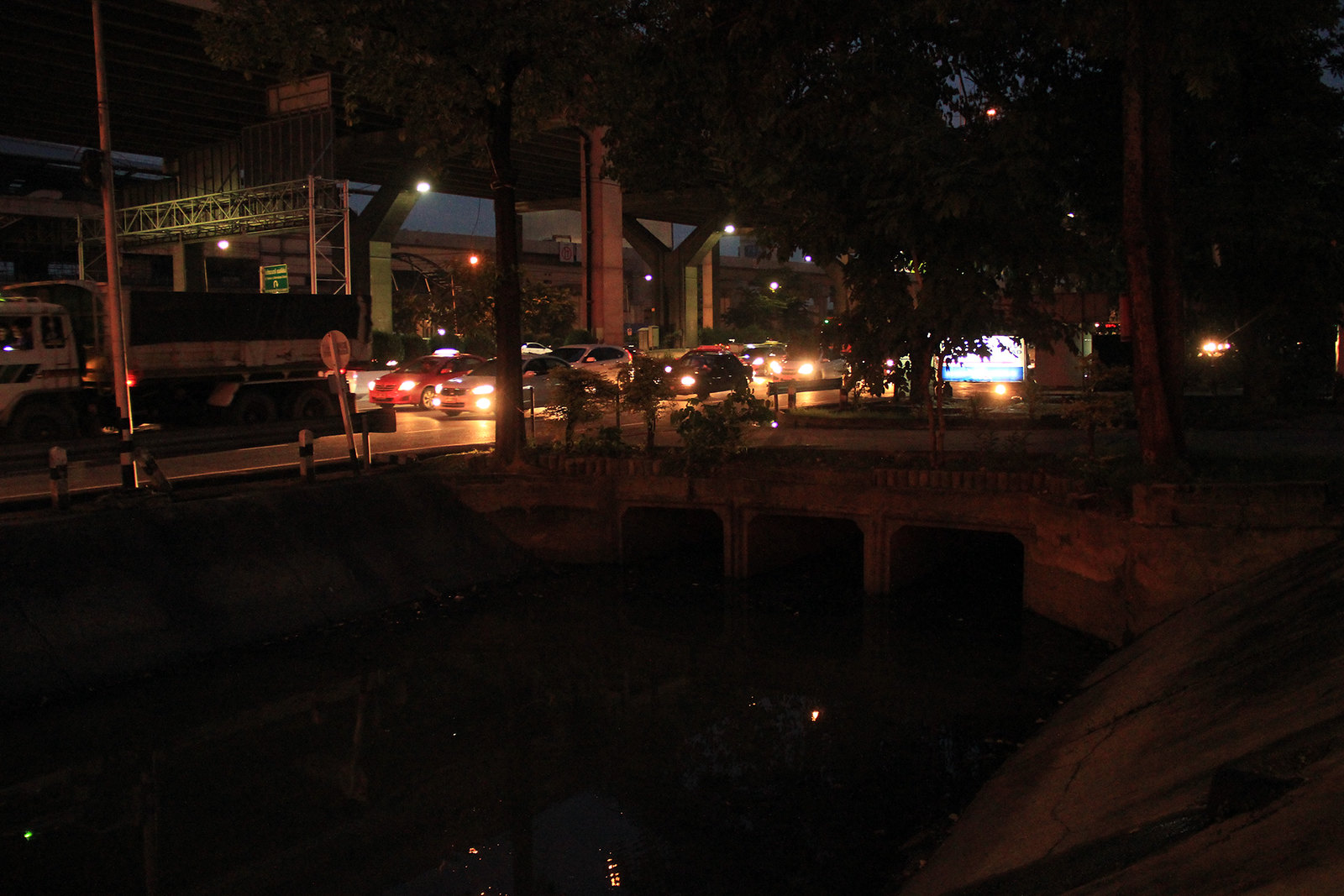
ริมคูน้ำถนนวิภาวดีรังสิต มองจากฝั่งปั๊มเชลล์ไปทางปากซอยวิภาวดีรังสิต 44 ภาพถ่ายเดือนตุลาคม 2559
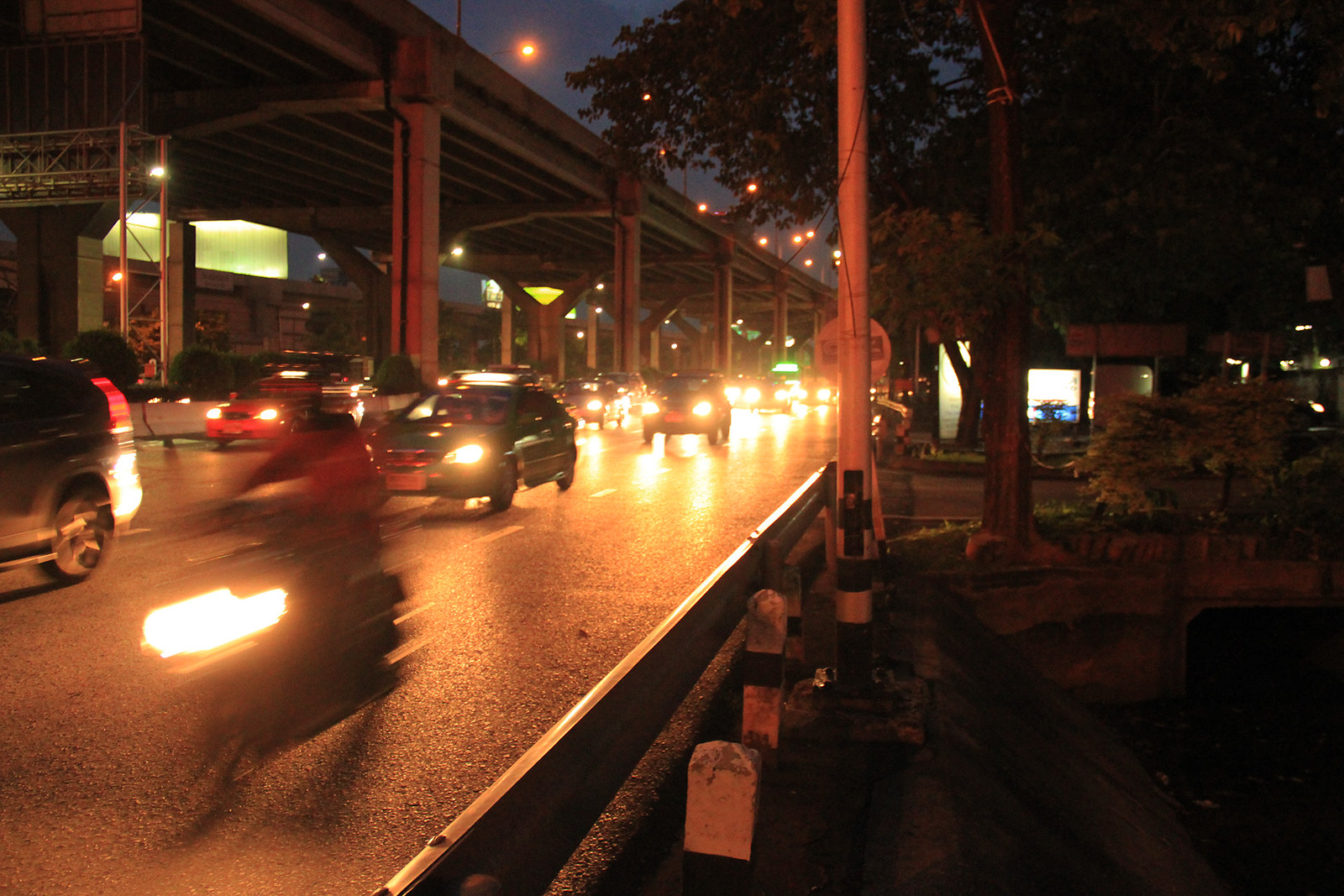
ริมถนนวิภาวดีรังสิต ริมคูน้ำด้านปั๊มเชลล์ ด้านหน้าคือถนนวิภาวดีรังสิต ป้ายไฟฟ้าที่ไกลออกไปคือปากซอยวิภาวดีรังสิต 44 ภาพถ่ายเดือนตุลาคม 2559

ภาพจาก Google Stree View บริเวณปากซอยวิภาวดีรังสิต 44 จุดลอบยิงบุญสนอง บุณโยทยาน ปัจจุบันบริเวณคูน้ำก่อนถึงปากซอยกลายเป็นจุดขึ้นลงรถไฟฟ้าชานเมืองสายสีแดง สถานีวัดเสมียนนารี (ที่มา: Google Stree View/เมษายน 2018)
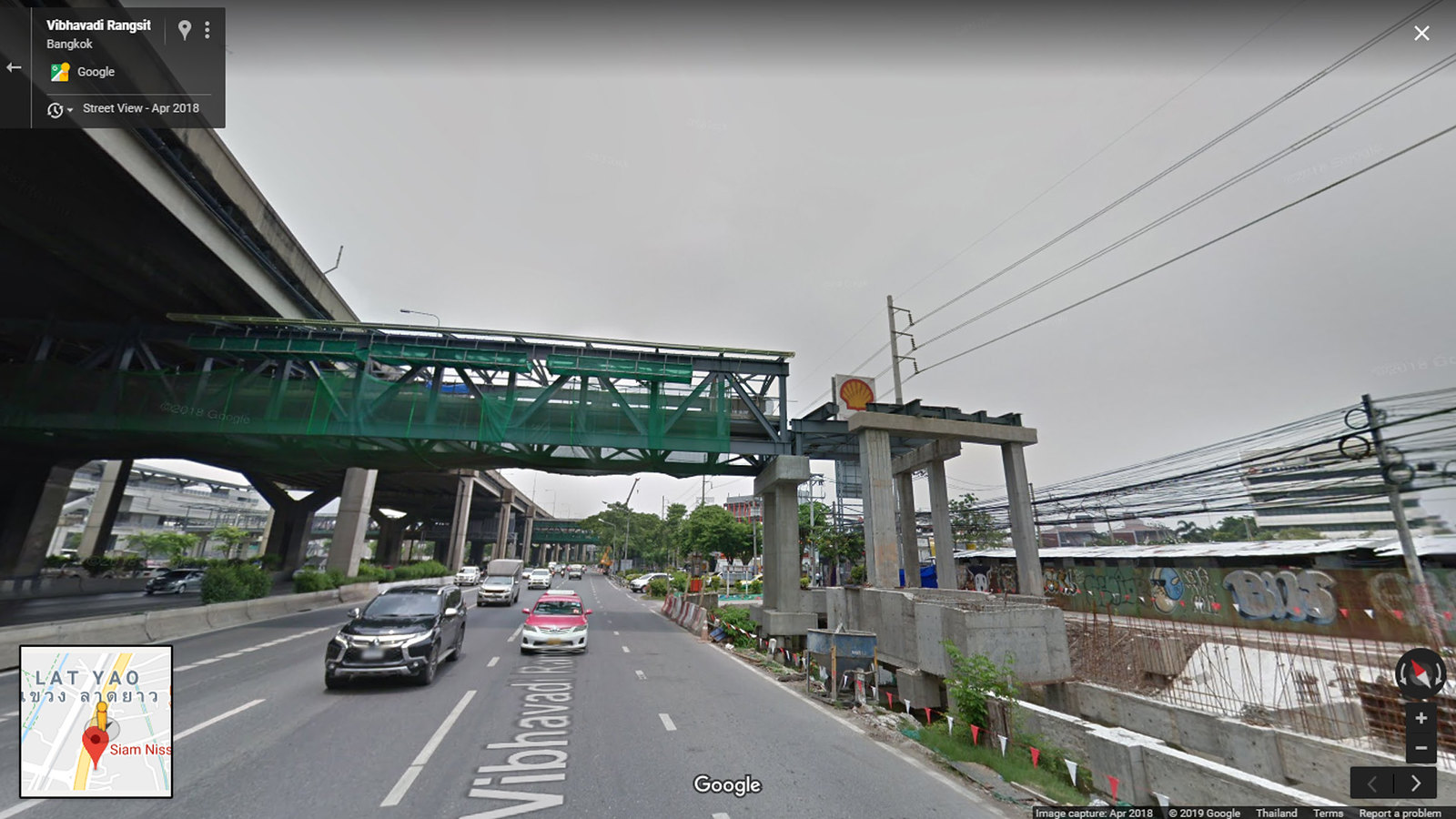
ภาพจาก Google Stree View แสดงภาพคูน้ำริมถนน ระหว่างปากซอยวิภาวดีรังสิต 44 และก่อนถึงวิภาวดีรังสิต 42 โดยตรงกลางที่เป็นปั๊มเอสโซ่นั้นปัจจุบันคือปั๊มเชลล์ โดยคูน้ำช่วงนี้เป็นจุดที่รถยนต์ของบุญสนอง บุณโยทยานไถลตกลงไป โดยบริเวณนี้ยังอยู่ตรงกลางระหว่างจุดขึ้นลงรถไฟฟ้าชานเมืองสายสีแดง สถานีวัดเสมียนนารี ฝั่งถนนวิภาวดีรังสิตขาเข้าทั้ง 2 จุดขึ้นลง (ที่มา: Google Stree View/เมษายน 2018)

แผนที่แสดงจุดเกิดเหตุในหนังสือพิมพ์ประชาธิปไตย วันที่ 29 กุมภาพันธ์ 2519
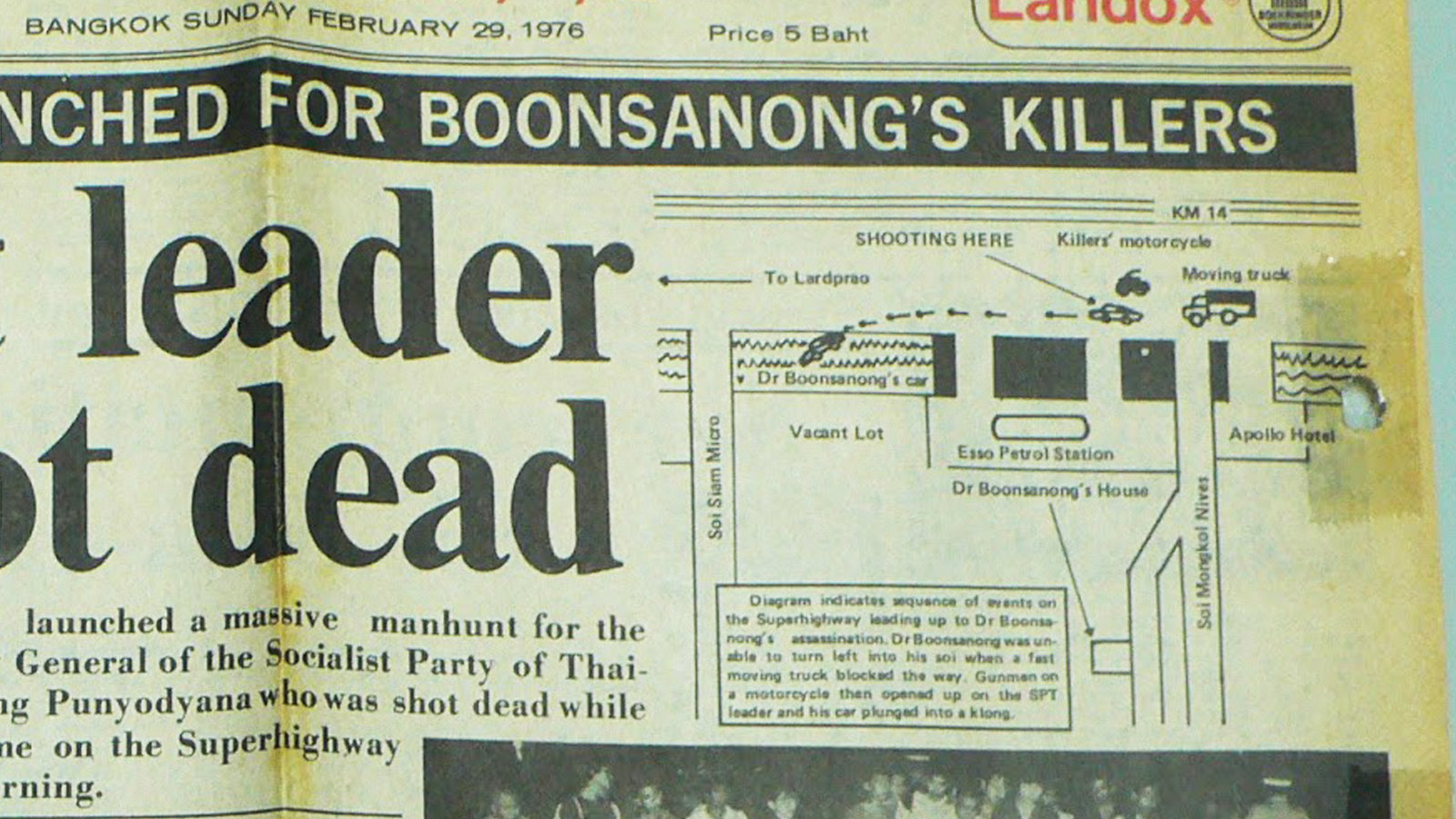
แผนที่แสดงจุดเกิดเหตุในหนังสือพิมพ์ Bangkok Post วันที่ 29 กุมภาพันธ์ ค.ศ. 1976 ระบุว่ารถของบุญสนอง บุณโยทยาน ไถลตกคูน้ำไกลออกไปจากจุดที่ถูกยิง
ผู้สื่อข่าวสำรวจจุดเกิดเหตุลอบสังหารบุญสนอง ใช้วิธีเทียบข้อมูลและแผนที่ ซึ่งแสดงในหนังสือพิมพ์ประชาธิปไตยฉบับวันที่ 29 กุมภาพันธ์ 2519 และ Bangkok Post ฉบับที่จำหน่ายวันเดียวกัน พบว่าปัจจุบันจุดลอบยิงบุญสนองคือปากซอย 44 ถนนวิภาวดีรังสิต ส่วนด้านตรงข้ามกลายเป็นสถานีรถไฟฟ้าชานเมืองสายสีแดง "สถานีวัดเสมียนนารี" โดยบันไดขึ้นลงรถไฟฟ้า ฝั่งถนนวิภาวดีรังสิตขาเข้าทั้ง 2 จุดทางขึ้นลง คร่อมอยู่ระหว่างจุดเกิดเหตุลอบยิงบุญสนอง และจุดที่รถยนต์ของบุญสนองตกลงไปในคูน้ำ
ส่วนจุดที่รถยนต์ของบุญสนองตกลงไปในคูน้ำ หากยึดตามแผนที่ของหนังสือพิมพ์ประชาธิปไตย จุดที่รถตกลงไปในคูน้ำจะห่างไปจากปากซอย 44 ถนนวิภาวดีรังสิต เล็กน้อย ขณะที่แผนที่ของหนังสือพิมพ์บางกอกโพสต์ ระบุว่ารถของบุญสนองแล่นเลยปากซอยออกไป เลยหน้าปั๊มน้ำมันเอสโซ่แล้วตกลงไปในคูน้ำก่อนถึงปากซอยสยามไมโคร
โดยปั๊มน้ำมันเอสโซ่ ซึ่งอยู่เลยปากซอย 44 ถนนวิภาวดีรังสิต กลายเป็นปั้มเชลล์ โดยหน้าปั๊มเชลล์ยังมีคูน้ำซึ่งอยู่ริมถนนวิภาวดีรังสิต และเมื่อตรวจสอบกับ Google Street View ซึ่งอัพเดทเดือนเมษายน 2018 พบว่าจุดขึ้นลงสถานีรถไฟฟ้าทั้ง 2 จุด บริเวณถนนวิภาวดีรังสิตฝั่งขาเข้า คร่อมอยู่ระหว่างจุดเกิดเหตุลอบยิงบุญสนอง และจุดที่รถยนต์ของบุญสนองตกลงไปในคูน้ำ
บุญสนอง บุณโยทยาน และกระแสขวาพิฆาตซ้ายหลัง 14 ตุลา
สำหรับบุญสนอง บุณโยทยาน เกิดที่บ้านประตูหวาย ต.เวียง อ.เมือง จ.เชียงราย เมื่อวันที่ 31 ธันวาคม 2479 เป็นอดีตนักเรียนทุน Rockefeller ภายหลังจากจบการศึกษาปริญญาเอกด้านสังคมวิทยามาจากมหาวิทยาลัยคอร์เนลในปี 2514 ได้กลับมาสอนที่มหาวิทยาลัยธรรมศาสตร์ เคยเป็น 1 ใน 100 รายชื่อผู้เรียกร้องรัฐธรรมนูญในช่วงก่อนเหตุการณ์ 14 ตุลาคม 2516 หลังจากนั้นร่วมก่อตั้งกลุ่มประชาชนเพื่อประชาธิปไตย (ปช.ปช) เคยเป็นสมาชิกสมัชชาแห่งชาติเมื่อปี 2516 เพื่อเลือกสภานิติบัญญัติแห่งชาติในการร่างรัฐธรรมนูญฉบับใหม่
ต่อมาหลังประกาศใช้รัฐธรรมนูญ 2517 ได้เป็นผู้ร่วมก่อตั้งและเป็นเลขาธิการพรรคสังคมนิยมแห่งประเทศไทย แม้บุญสนองซึ่งลงเลือกตั้งทั่วไป 26 มกราคม 2518 และเลือกตั้งซ่อมในเดือนมิถุนายนปีเดียวกันอีก 1 ครั้ง แต่ไม่ชนะการเลือกตั้ง อย่างไรก็ตามพรรคสังคมนิยมแห่งประเทศไทย เคยชนะเลือกตั้งได้ ส.ส. 15 ที่นั่งในการเลือกตั้งทั่วไปปี 2518 และได้ ส.ส. 2 ที่นั่ง ในการเลือกตั้งทั่วไป 4 เมษายน 2519 อย่างไรก็ตามบุญสนองก็ถูกลอบยิงดังกล่าว
จากบทความ "เหตุการณ์ 6 ตุลาฯ เกิดขึ้นได้อย่างไร" โดยสุธาชัย ยิ้มประเสริฐ เผยแพร่ในเว็บไซต์บันทึก 6 ตุลา ระบุว่านับตั้งแต่หลังเหตุการณ์ 14 ตุลาคม 2516 จนถึงก่อนเหตุการณ์ 6 ตุลาคม 2519 มีความพยายามแบ่งแยกขบวนการและทำลาย และใช้ความรุนแรงสกัดกั้นการเคลื่อนไหวของนักศึกษาและประชาชน โดยนอกจากการใช้สถานีวิทยุยานเกราะและสื่อมวลชนฝ่ายอนุรักษ์นิยมออกข่าวโจมตีขบวนการนักศึกษาและประชาชนแล้ว ยังมีการจัดตั้งพลังมวลชนฝ่ายขวา ใช้การลอบสังหารผู้นำฝ่ายนักศึกษาและขบวนการประชาชน ในกรณีนี้รวมทั้งการลอบสังหารแกนนำของสมาพันธ์ชาวนาชาวไร่แห่งประเทศไทยรวมทั้งการทำร้าย และการปาระเบิดใส่ที่ชุมนุมและสถานที่ปราศรัยของพรรคการเมือง โดยระหว่างปี 2517 จนถึงก่อนเหตุการณ์ 6 ตุลาคม 2519 มีผู้เสียชีวิตจากความรุนแรงทางการเมืองรวมทั้งกรณี "ขวาพิฆาตซ้าย" ไม่ต่ำกว่า 101 ราย
เผยแพร่ครั้งแรกในเว็บไซต์ประชาไท 28 ก.พ. 2562
วันเสาร์ที่ 2 มีนาคม พ.ศ. 2556
งานรำลึก 37 ปี การจากไปของ ดร.บุญสนอง บุณโยทยาน
-พลวัตพรรคการเมืองในอเมริกากลาง กรณีศึกษาพรรคการเมืองในเอลซัลวาดอร์
อานนท์ ชวาลาวัณย์
กลุ่มประกายไฟ
-พรรคการเมืองทางเลือกในยุโรป กรณีศึกษาพรรคการเมืองทางเลือกในเยอรมัน
ดร.จิตติพร ฉายแสงมงคล
เครือข่ายพลเมืองเน็ต
-พรรคฝ่ายซ้ายในอาเซียน กรณีศึกษาพรรคการเมืองฝ่ายซ้ายในมาเลเซีย
พัชณีย์ คำหนัก
นักวิจัยโครงการรณรงค์เพื่อแรงงานไทย
-การกลับมาของพรรคสังคมนิยมในฝรั่งเศส
ดร.ปิยบุตร แสงกนกกุล
คณะนิติศาสตร์ มหาวิทยาลัยธรรมศาสตร์
ดำเนินรายการโดย พิเชฐ ยิ่งเกียรติคุณ
SIAM INTELLIGENCE UNIT
วันพุธที่ 27 กุมภาพันธ์ พ.ศ. 2556
คำรำลึกถึง 37 ปี การจากไปของ ดร บุญสนอง บุณโยทยาน เลขาธิการพรรคสังคมนิยมแห่งประเทศไทย
28 กุมภาพันธ์ 2556
วันเสาร์ที่ 16 กุมภาพันธ์ พ.ศ. 2556
“Carl A. Trocki” เขียนถึง "บุญสนอง บุณโยทยาน"
Journal article by Carl A. Trocki; Bulletin of Concerned Asian Scholars, Vol. 9, 1977
Dr. Boonsanong Punyodyana fell to an assassin's bullet at about 1:30 a.m. on 28 February, 1976. At the time of his death, he was the Secretary-General of the Socialist Party of Thailand. There is little doubt that his death was politically motivated. Since few, among Thailand's ruling elite regretted his passing, not many expect his murderers to be apprehended. He will be sorely missed however, by his wife and two daughters, by his academic colleagues, and by the Thai people.
Boonsanong was both a brilliant scholar and a tireless fighter for his political ideals. He was one of those rare social scientists who was able to excel on both the abstract and the practical levels. Among the many who mourned him there were thousands of students, academicians, writers and artists, farmers, laborers, civil servants, especially the nation's progressives. More than 10,000 people attended the memorial orations held at Thammasat University a few days after his death. They recognized his death as a symbolic blow to themselves and to democracy in Thailand.
As one of the founding members and leaders of the Socialist Party of Thailand, Boonsanong worked to build this political group into a people's party. He was the party's mentor and wrote most of its platforms and policy statements. He wanted the party to educate and mobilize the people to build democratic socialism in Thailand.This task was not an easy one. As he pointed out in a paper delivered at a symposium in Tokyo which appropriately coincided with the October 14, 1973, uprising, few Thais, including intellectuals, had a clear concept of what socialism was.
Under Thailand's military regimes the study of progressive social thought had consistently been forbidden. As a result he found it necessary to conduct regular study sessions for his own party members, most of whom were students or recent graduates.
The Socialist Party of Thailand was a new kind of party with a new brand of politics. Most political parties in Thailand have been, and remain today, mere groupings of politicians held together only by financial support and a general greed for power and the wealth that comes with it. The outcome of elections is determined by the number of votes which candidates can buy. Since the Socialist Party of Thailand championed the cause of the poor and exploited masses of the Thai people, it found little financial support. Since it had no wealthy backers it won few elections. In addition, by mid-1975 the party found itself first the object of a vicious slander campaign followed by bombings, official harassment, and ultimately assassination.
If anyone understood the repressive and exploitative nature of Thai society, it was Boonsanong. His research as a sociologist had given him a clear conception of the conservative underpinnings of the Thai social system.
This awareness came partly from his study of Norman Jacobs' theory of "modernization without development," as well as from personal experience in community development work in Thailand. In his writings, Boon attacked the concepts of Thai society which had been put forward by Embree and Phillips and other Western scholars.
As a Thai, he understood only too well the essential hypocrisy which lay behind the smiling Siamese" facade. Thai society is not "loosely structured." Rather, the Thai peasantry is permanently and deliberately atomized in order to ensure continued domination by a very closed and rigidly-structured elite group. Thai peasants have been pictured as lazy, easy-going and obedient to elders and authority.
Boon saw these attitudes as the peasants' simple acknowledgement of their condition. Why work harder when the surplus will only go to the landlord, the money-lender or the tax collector? Why fight when the only reward is a bullet in the head? Boonsanong's fate is proof of the effectiveness of his critique of Thai society. From Scholar to Socialist
The Thai educated elite has had a clearly defined social status and role which David Wilson has characterized as follows.
The educated leadership of the nation is a career group. Their place in society is made. They have opportunities for useful, responsible and satisfying work for which their training is designed to prepare them. Such a group, having a substantial stake in society as it is presently arranged, would understandably be conservative insofar as fundamental social change is concerned.
Boonsanong died because he deviated from this norm. As a student and then as a scholar, he had reaped the benefits that his society could offer him. An intelligent and ambitious young man from the northern Thai town of Chiengrai, Boonsanong excelled in the highly competitive Thai educational system. In fact, at first he appeared to be closely wedded to the establishment. After graduating from Chulalongkorn University in 1959, he worked for the Thai government, preparing English translations of official manuals. His skill in English and his familiarity with the Thai governmental structure gained him employment with the Unites States Information Service in Bangkok as a writer and researcher. In 1962, he won a Fulbright-Hayes Scholarship to study for the Master’s degree in sociology at the University of Kansas. At that point, one would not have predicted that he would one day lead student demonstrators to rip the bazen eagle from the gate of the U.S. Embassy on Wireless Road, as he did following the Mayaquez incident last year.
After receiving the M.A., Boonsanong returned to Thailand where he joined the staff of Thammasat University as a lecturer in sociology. In 1967 he returned to the U.S. and spent five extremely productive years there. He completed a Ph.D. in sociology at Cornell University, published several articles, spend a year at Harvard and another year as Visiting Professor at the University of Hawaii. By the time of his return to Thailand in 1972, he had established himself as an international recognized scholar in his field. It was a record that few of his colleagues in Thailand could equal, including those who were many years his senior.
Boonsanong had gained more that just academic skills and titles during his years in America. The social and political context could not help but affect him. It was the period of the rise of the student movement against the war in Vietnam on American campuses, and the formation of the Committee of Concerned Asian Scholars within Asian studies centers, including the Southeast Asia Studies Center at Cornell where Boon studied. In April 1970 he attended the second national CCAS convention in San Francisco, contributing a paper entitles “False assumptions: the sources of difficulty in Thai economic development.” On his return to Thailand he was considered very “American” for his failure to maintain the correct social distance from the masses expected by other elites of a man of his status and background. He was open and non-elitist, rarely passing up an opportunity to engage a person in conversation, whether that person was a university dean or a man selling noodle soup from a pushcart in the street.
Back at Thammasat University in June 1972, he immediately became one of the university’s leading activists. This was a time of general intellectual ferment. Boon was in his element, writing papers, attending meeting, carrying out research, organizing and lecturing to hundreds of rapt and enthusiastic young people. The student movement which was to overthrow the military dictatorship was beginning and Thammasat was its epicenter.
Political Activities
Boonsanong’s life was profoundly affected by the events of 14 October 1973, when the students rose up and drove out the dictators, Prapas Charusathian, and Thanom and Narong Kittikajorn. Although he happened to be attending a scholarly conference in Japan on those fateful days, he had been a prime figure in the movement which led up to sip-see tula, the day from which everything is now dated. With about 100 of his colleagues and students from Thammasat and other universities he had signed a petition requesting a constitution and the restoration of democratic government. It was the arrest of thirteen of these petitioners on 12 October that had touched off the student demonstrations.
Boonsanong returned to Bangkok on the first available flight from Japan where he had, appropriately enough, delivered a paper on “Socialism and Social Change in Thailand.” He immediately plunged in the ferment of political activity generated by the popular movement and the prospect of democratic government. As one of the authors of the petition for a constitution, he was in the forefront of the movement to build a progressive democratic structure in Thailand. With the National Student Center of Thailand (NSCT) leader, Thirayut Boonmee, and a number of others, Boonsanong founded the People for Democracy Group (PDG) in early 1974. The PDG was intended as a pressure group to promote democratic reforms, education in democracy for the people and to influence the government and the committees being formed to draft the new constitution. The PDG quickly became the vanguard of the progressive forces in the country.
Boonsanong was also chosen by the King as one of the 2600-odd members of the constituent assembly which was to elect an interim parliamentary body while the constitution and elections were being prepared. At this point he began to acquire some very serious enemies-the military, the senior bureaucrats, the King’s Privy Council, the capitalists, and the police. He found himself marked as a radical and a “dangerous” person.
At this time, Boon bagan to move out of academic life and to become a politician. After the constitution had been written and elections scheduled, the PDG became the nucleus for a number of other progressive groups which include labor unionists, farmers’ organization, studentsm and the “old” socialists from the Northeast. About 50 meetings were held, mostly at Boon’s house during December 1974. There were negotiations, positions hammered out, a platform and ideology was formulated, with Boon doing the pushing and most of the writing. All of this resulted in the formation of the Socialist Party of Thailand (SPT). Boon became secretary-general of the party, a position which he held until his death.
In the election of January 1975, Thailand’s first under the new constitution, about 10 members of the new Socialist Party won seats. Having chosen to run in a Bangkok Constituency which was a stronghold of the Democratic Party of Seni Pramoj, Boon was not elected. Throughout this period Boonsanong continued to be a major party activist, spending all his time educating, writing, speaking and organizing throughout the country. Because of his international reputation, he was able to project the voice of the people to an audience beyond the borders of Thailand. For example, the Far Eastern Economic Review of January 17, 1975, carried a long interview with Boonsanong entitled “The Socialist’s Viewpoint.” He took up the role of a gadfly and was very blunt and outspoken in criticizing government corruption, the inequities of Thai Society, Thailand’s involvement in the Indochina war and the U.S. military presence in Thailand. This did little to endear him to the entrenched military and bureaucratic officials who had remained in their positions since the Thanom regime. It was soon whispered that he was a “communist.”
By the middle of 1975, the Thai right-wing had begun to make a comeback. They had been thrown into disrepute with the ousting of the “Terrible Trio,” and had been maintaining a relatively low profile while the students, workers and farmers dominated the political scene.
Boon was at the center of the first major confrontation between the left and the newly mobilized right-wing activist groups. The death of an MP in Chiangmai necessitated a by-election, and Boon was determined to capture the seat for socialist. He was the first to declare his candidacy and to begin campaigning. At first, he seemed to have a fairly good chance of winning. Then, a number of right-wing activist groups moved in to stop him and a great deal of money was thrown into a smear campaign. “Patriotic citizens” carrying M-16’s and hand-grenades drove his canvasses out of the villages. His car was stopped at a police checkpoint and a number of illegal M-16’s were discovered. Understandably his defeat in Chiangmai made Boon somewhat disillusioned with electoral politics.
By the time Kukrit’s government fell in January 1976 Boon had decided to resigned from the secretary-generalship of the SPT and resume his academic career. He could see that social reform could not come to Thailand through the current legislative process. However, even this route was blocked. Reactionary forces were ready to smear him when he sought university positions. Therefore, although he was not a candidate for the Aril 4, 1976, elections, he remained as secretary-general and continued to help the party’s candidates to campaign. He planned to resign after the elections.
Unfortunately, he never got a chance. He was returning home from a party in his car, alone. When he slowed to turn into his lane off the main highway, he met two gunman. There were three shots, the fatal one hitting him in the neck. It was obviously a professional “hit.” The gunman quickly disappeared and police investigations have been conspicuously ineffective.
The impact of his two years and nine months in Thailand can still not be fully measured. Boonsanong represented the spirit of Thai democracy. The collapse of the Seni government in September 1976 is only the flesh rotting form the long-dead corpse. Boon’s legacy is the body of his scholar work and the Socialist Party of Thailand. The SPT is now in the process of falling back on the people in preparation for the coming wave of repression. Perhaps one day they will re-emerge from the ashes to rebuild the kind of society that Boon envisaged.Conference papers and unpublished works.
“False Assumptions: The Sources of Difficulty in Thai Economic Development,” Paper presented to the Second National Conference of the Committee of Concerned Asian Scholars, San Francisco, April 4, 1970.“Socialism and Social Change in Thailand,” Paper presented to the Symposium on Sociology and Social Development in Asia, Tokyo, Japan, October 16-22, 1973 “Minority Groups and Minority Class: The Oppressed and Oppressor in Thai Social Structure,” Paper presented to the Conference on the Majority-Minority Situation in Southeast Asia, Manila, Philippines, May 8-10, 1974.
The Chinese in Thailand: A Synopsis of Research Approaches,” Paper presented to the Research Workshop on Contemporary Chinese Communities in Southeast Asia, De La Salle College, June 24-28, 1974. (With Dr. Chitt Hemachudha, M.D.) “A Summary Statement: Communication and Education in Family Planning in Thailand,” (undated,c. 1974).
Bibiolography of Boonsanong Punyodyana’s writings
Published works
“Social Mobility and Economic Development,” Sociological Bulletin. (Indian Sociological Society, Vol. XVI, No. 1, March 1967), 16 pp.“Social Structure, Social System and Two Levels of Analysis: A Thai View,” in Hans-Dieter Evers, ed., Loosely Structured Social Systems: Thailand in Comparative Perspective. (New Haven: Yale Southeast Asian Studies, Cultural Report Series 17, 1969). Pp. 77-105.Chinese-Thai Differential Assimilation in Bangkok: An Exploratory Study. (Ithaca: Cornell Data Paper No. 79, March 1971). 117 pp.“Later-Life Socialization and Differential Social Assimilation of the Chinese in Urban Thailand,” Social Forces. (Vol. 50, 2, December 1971). Pp. 232-238.(With Peter F.Bell). “Modernization Without Development: Thailand as an Asian Case Study,” in Journal of the Graduate School.(Bangkok: Chulalongkorn University, Jan-June 1972, Vol. 4). Pp.121-133.(With Peter F.Bell). “The sources of social change in Thailand” in Journal of Contemporary Asia. (Vol. 4, 2 1974) Pp. 209 – 217.(With Amphon Namatra). “Japan’s Role and Power in Southeast Asia: The Case of Thailand,” Paper presented to the International Conference on Japan in a New Pacific Era, Academy House, Seoul, Korea, December 4-7, 1972.“The Changing Status and Future Role of the Chinese in Thailand,” in Trends in Thailand. (Singapore: Institute of Southeast Asian Studies, M. Rajaretnam & Lim So Jean, ed., 1973). Pp.56-69.“The Revolutionary Situation in Thailand,” Southeast Asian Affairs, 1975, Singapore: 1975). ISEAS. Pp. 187-195.
Dissertations
“A Sociological Explanation of the Origins of Differential Development in Japan and Thailand,” (Unpublished M.A. Thesis, University of Kansas, Lawrence, Kansas, 1964),. 154 pp.“Thai Selective Social Change: A Study with Comparative Reference to Japan,” (Unpublished Ph.D. Thesis, Cornell University, December 1971), 379 pp. The following interview with Boonsanong Punyodyana was conducted by Norman Peagam of the Far Eastern Economic Review and printed in FEER in January 1975.
Interview.
How did you become involved in politics?
Since my undergraduate days, I have thought it the duty of everyone to be concerned about politics. I took an active part in demonstrations against Pibul (Field Marshal Pibulsongkhram) in 1957 and I have written in Thai and English about socialism and the future of Thailand. I have always admired my fellow –countrymen who sacrificed their comfort and freedom for the bettermen of Thai society; I have many friends who have been in prison for political reasons. Since I had the opportunity of a good education and come from a petit bourgeois background, I think it would be selfish and irresponsible of me to think only of the good life and isolate myself from the masses. When I returned from my professorship in the United States in 1972 (Visiting Professor at the University of Hawaii), I immediately became active in speaking and writing and joined student groups. Since October 1973, I have continued to be active, for example, helping the Civil Liberties Union and People for Democracy Group.
The Communist Party of Party was recently reported as saying that only the seizure of power by armed force could establish a “people’s government” in Thailand. What do you think of that?
There is nothing new in that statement. In fact, the Communist Party of Thailand has engaged in armed struggle for about the years and the Thai Government has found it impossible to disengage. We can understand why many people in this country are unwilling to show faith in elections. As you know, even in the present election, every candidate supported by right-wing parties in using huge sums of money and all sorts of non-political tactics to mislead the voters. You can count on your fingers the number of workers and farmers-and they constitute the vast majority of the population-who are to stand for election. We have a few in our party, but they are the exception rather than the rule.
How would you deal with the problem of insurgency?
As long as our Government remains oppressive, as long as the economic and social system of this country continues to grant privileges to the elite, the ruling class, the capitalists and the bourgeoisie, and especially as long as the Government of Thailand maintains close ties with American imperialism, it is only natural that the freedom-loving people of this country will not cease resisting. The communists are a good example of such patriotic, freedom-loving people. The Socialist Party of Thailand seriously intends to bring about fundamental change in Thai society. If we are successful, it would also be natural, as one can reasonably expect, that problems of unrest and insurgency would automatically disappear.
In several countries with a parliamentary system, disillusionment and cynicism have become apparent as elected governments fail to respond to popular demand, prove unrepresentative or as elected leaders become arrogant or corrupt. Are you optimistic about the chances for parliamentary democracy in Thailand?
We cannot be optimistic with the parliamentary system. We are well aware of the failure of the parliamentary system in many countries, including big democratic capitalist countries like the United States and Britain. As a matter of fact, many socialists in Thailand are totally disillusioned with it. This is part of the reason why we cannot field candidates in all constituencies in this election. But at the same time, we must continue our struggle wherever possible, even when the rules of the fight are defined by the capitalists. It has already been said by General Prapan (Secretary-General of the right-wing League of the Free People of Thailand) that if the Socialist Party of Thailand won 70 seats in the new Parliament, there would be a coup d’etat within six months. It might happen. But we are confident that the people of Thailand, especially those elements sufficiently organized such as some of the workers and famers, would be equally ready to fight back.
Would you nationalize any major industries?
The Socialist Party’s policy concerning important industries and business such as banking, mining and oil production and distribution is t nationalize them for the benefit of the people. Our plan calls for fair comprehensation to the existing private owners in the form of bonds or long-term payments by the Government. There are already 108 existing State enterprises and we intend to raise their standards of efficiency. At present they are, at best, an expression of State capitalism and do not represent a socialist model. They serve as an outlet for retired military and civil bureaucrats who take the lion’s share of the profits of these enterprises at the expense of the country’s economy.
What is your party’s stand on land reform?
In the long run, all farmers would be assured of the right to cultivate land and benefit according to their needs from production. They would not have the right to transfer the ownership of land. But the exchange of goods and services would be carried out according to a total national plan so that production and distribution would not be interfered with by middlemen and other non-productive elements. The sale of rice would be handled strictly by the Government for the benefit not necessarily of “the State,” but primarily of the people. In socialist Thailand, all people would benefit from free education and free health care. Planning for production would not be geared to profit-making, but to the betterment of living conditions.
Are you happy about the level of Japanese involvement in the Thai economy?
I must say that, even now, there is a great trade imbalance between Thailand and Japan. Japanese investment, as a rule, is beneficial to Japanese investors as well as big Thai capitalists. In a capitalist economy, investment and business are not planned for anything else except maximum benefit for the capitalists. As such, Japanese enterprises in Thailand as well as Thai-based factories have caused a horrible amount of destruction to the environment. The emphasis on luxury goods, such as cars, is very detrimental to the economy and the quality of life. In a socialist Thailand, international trade would be handled on a state-to-state basis. Imports must be controlled so that they are beneficial to the people at large.
The Government has said that hill tribes, numbering hundreds of the thousands of people in the north of the country, will not be allowed to vote in the coming elections. What is your view on this?
We have a clear policy with regard to national minorities in Thailand, for example, the Vietnamese refugees who have lived in Thailand for nearly three decades and may have had children and grandchildren born in Thailand, the Muslims of Malay origin in the south, and the Chinese scattered throughout the country. Our policy is to incorporate these national minorities into the mainstream of Thai political life and to permit them to establish their own administrative communities under the sovereignty of Thailand. In short, the orientation is towards full democracy and equality for all people in all spheres of life, political, economic and social.
The North Vietnamese Government has said it expects Thailand to pay compensation for the damage caused by Thai-based American planes and Thai forces in Vietnam during the war. What is your opinion about this?
I think they mean the reactionary government which cooperated with imperialist America. I do not think they mean to impose any hardship.
What is your policy on the presence of U.S. forces in Thailand?
We have established a policy of having them withdrawn immediately. We would establish and maintain friendly relations with all countries, including the U.S., on the basis of equality and mutual respect.








